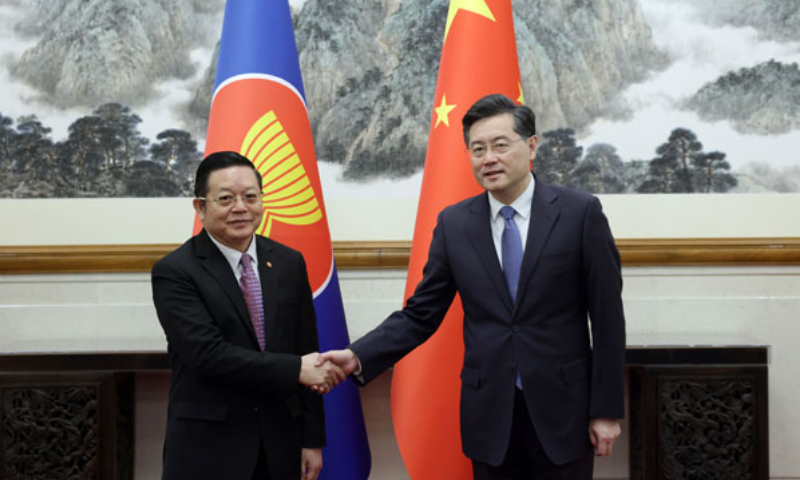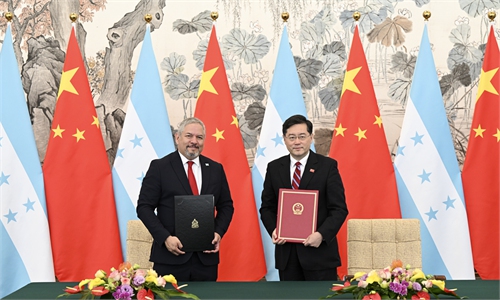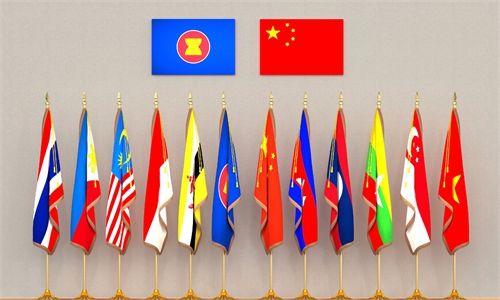
Chinese State Councilor and Foreign Minister Qin Gang (right) meets with ASEAN Secretary-General Kao Kim Hourn in Beijing on Monday. Photo: fmprc.gov.cn
China is willing to work with the Association of Southeast Asian Nations (ASEAN) to eliminate external interference and provide institutional guarantees for building the South China Sea into a sea of peace, friendship and cooperation, Chinese State Councilor and Foreign Minister Qin Gang said during a meeting with ASEAN Secretary-General Kao Kim Hourn in Beijing on Monday.
China maintains a high degree of stability and continuity in its domestic and foreign policies, and is committed to achieving the great rejuvenation of the Chinese nation through Chinese modernization. This will bring stability to regional peace and security, and provide stronger driving forces for regional development and prosperity, Qin said.
This year marks the 10th anniversary of building a closer China-ASEAN community with a shared future, as well as the 20th anniversary of China's accession to the Treaty of Amity and Cooperation in Southeast Asia (TAC). China and ASEAN have forged a path of peaceful coexistence between large and small neighboring countries, setting a benchmark for friendly neighborliness. China is willing to work with ASEAN to uphold the purposes and principles of the United Nations Charter and the spirit of the TAC, and to jointly maintain regional rules and order, according to Qin.
China is willing to take the lead in signing the Protocol to the Treaty of Southeast Asia Nuclear Weapon-Free Zone (SEANWFZ or Bangkok Treaty) and work with ASEAN to advocate solidarity and win-win cooperation, jointly safeguarding regional security and stability, Qin said.
China appreciates the 10 ASEAN nations for joining the "The Group of Friends of the Global Development Initiative (GDI)," and is willing to promote the mutually beneficial cooperation between Belt and Road Initiative and the ASEAN Outlook on the Indo-Pacific (AOIP) in crucial areas, Qin said.
Qin added that China hopes that both sides can take full advantage of the Regional Comprehensive Economic Partnership (RCEP) trade deal to promote early and phased results in the 3.0 version of negotiations on the China-ASEAN Free Trade Area, providing new driving force for East Asia's economic growth.
China is willing to work together with ASEAN to implement the Global Civilization Initiative, promote people-to-people exchanges, and provide inexhaustible driving force for mutually beneficial cooperation between the two sides, Qin said.
Qin also pointed out that China is willing to work with the ASEAN nations to eliminate external interference, to effectively implement the Declaration on the Conduct of Parties in the South China Sea (DOC), and to reach the Code of Conduct in the South China Sea (COC) as soon as possible, providing institutional guarantees for building the South China Sea into a sea of peace, friendship and cooperation.
Myanmar is a member of the ASEAN family, and China fully supports ASEAN in using the "ASEAN way" to mediate and promote constructive dialogue, Qin added.
Kao said that China is a good partner of the ASEAN, and the ASEAN is willing to further enhance cooperation with China in various fields and step up the negotiations on the 3.0 version of China-ASEAN Free Trade Area, to intensify negotiations on the COC and work together to maintain regional security and stability, and promote common prosperity in the region.
Kao added that the ASEAN appreciates China's support for ASEAN's central and constructive role in promoting the easing of the situation in Myanmar, supports China's GDI and agrees with promoting exchanges and learning from each other, and that ASEAN is willing to cooperate with China on relevant initiatives.
On Monday, Chinese Minister of Agriculture and Rural Affairs Tang Renjian also fully recognized the achievements of China-ASEAN agricultural cooperation, during a meeting with Kao.
Tang put forward a four-point proposal to consolidate and expand bilateral cooperation, including to implement the important commitments of the China-ASEAN Summit, to strengthen strategic communication in agriculture and actively promote the in-depth integration of the "Action Plan on China-ASEAN Green Agriculture" and the "ASEAN Sustainable Agriculture Guidelines," to continue supporting the regional emergency rice reserve mechanism and enhance the food security emergency response capacity of ASEAN nations, and to strengthen cooperation in the areas such as smart agriculture and digital rural development under the RCEP framework, to promote regional agricultural development to enhance resilience and to make transformation and upgrade and to promote agricultural economic and trade cooperation to rise to a new level.
Global Times


